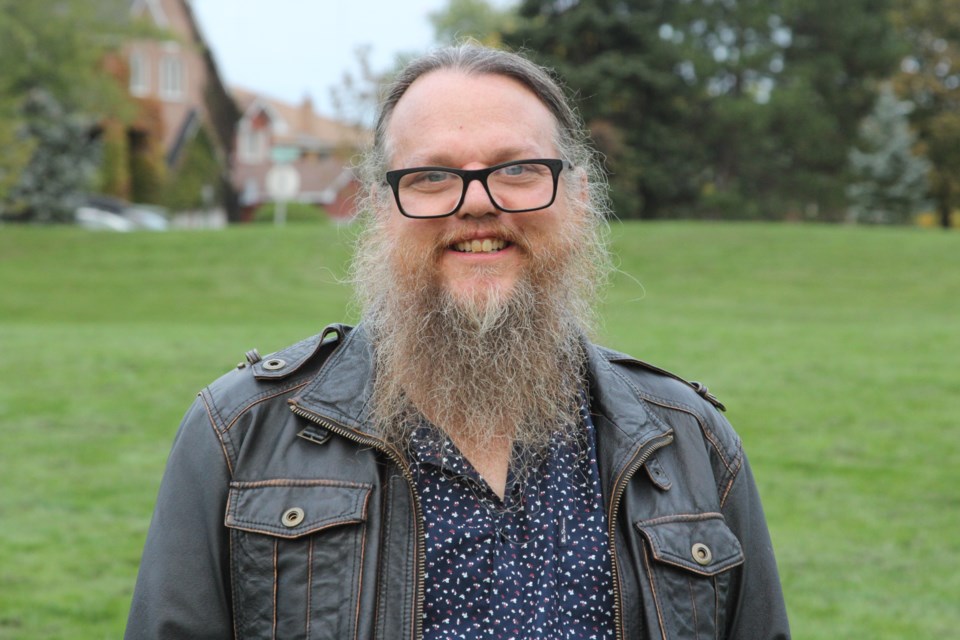A Sault-born expert on homelessness says a big part of his work is dedicated to dispelling myths and he believes looking at addiction through a more compassionate lens can lead to better outcomes.
Iain De Jong is the president and CEO of OrgCode, an organization with the mission to help communities and organizations make homelessness ‘rare, brief and non-recurring.’ He has spent more than two decades working with municipalities and organizations that deal with unhoused population, including 10 years within the homeless services department with the city of Toronto.
About 12 years ago De Jong began consulting for a wider range of clients, including organizations like Social Services Sault Ste. Marie and most recently for Greater Sudbury. His firm also consulted on the national pandemic response and recovery plan for homeless services in Canada.
“It’s a pretty fantastic privilege I have been given to enter into the space of helping good organizations get better,” said De Jong.
Born and raised in the Sault, De Jong moved away after high school to pursue higher education and work, but said he still has family in the area.
In that time away he has seen the issue of homelessness becoming more pronounced in many places, including Northern Ontario cities.
”I am of an age where it wasn’t as visible when I was a kid and seeing the transformation over the past couple of decades in the north — you see that homelessness is something that touches communities large and small, urban, suburban or rural. The north is no exception,” said De Jong.
“When I have the opportunity to do my work in the north, whether it be in Sudbury or a little bit of work in the Sault, I always seize those opportunities,” he added.
Mike Nadeau, CEO of Social Services SSM, said his organization has worked with De Jong and his firm a number of times over many years.
”He was instrumental in revitalizing our homelessness and shelter systems, using best practices and lessoned learned through his work around the globe,” said Nadeau of De Jong and his work. ”Iain uses a human centred approached to system development that encompasses compassion and individual resiliency, which has resulted in the successful housing of over 100 chronically homeless community members.”
In 2019 De Jong published The Book on Ending Homelessness, which brings together all of the knowledge he accumulated on the subject over more than two decades in the field. Since then it has frequently remained a FriesenPress best seller.
De Jong said the book has found an audience among frontline staff and supervisors in non-profits, as well as with elected officials and public servants in government.
”I remain hopeful that it continues to educate and stimulate robust discussion on preventing and ending homelessness,” he said.
De Jong said a big part of his work is dispelling the misconceptions around homelessness that policy makers and the general public often have.
One common misconception, said De Jong, is around the use of alcohol and other drugs by those experiencing homelessness.
Although rates of substance use and mental illness are higher within the homeless population, De Jong said it would be incorrect to say everybody in that demographic does.
“One of the realities is, most of the people in Canada who have a substance use disorder or are living with a mental illness are more likely to be housed than they are to be homeless,” said De Jong.
The COVID-19 pandemic has had a negative on those people who are living with addiction.
“If we look at the data throughout the pandemic, communities north, south, west and east have seen the rates of opioid response, opioid death, opioid incidents increase,” said De Jong. ”The data is confirming what people on the front lines are experiencing, which is we need to look at opioid use as a health issue, not a criminal justice issue when substance users are involved.”
He added that substance use should be looked at through a different lens.
“If we look at it from a compassionate perspective, we reach different conclusions. Instead of saying what is wrong with this person we reframe it to what happened to this person? Instead of thinking about people making their own bed and laying in it, we are shifting our thinking to what is the impact of trauma on peoples’ lives and seeing substance use as a coping mechanism for past trauma,” said De Jong.
Once those conversations around compassion are started, the discussion can shift to solutions, said De Jong.
”In particular what does the evidence show around safe consumption sites, trying to increase the drug supply safety and trying to get to a place where we can talk about substance use in health terms as opposed to justice terms. I think that sort of communication at a community level is difficult to start at times,” he said.
Most people who experience homelessness do so for a short period of time once in their lives, said De Jong.
“We tend not to pay a lot of attention to that group of people, we tend to be occupied, perhaps rightly, with people who are longer term in their homelessness. The majority of homelessness is short term,” he said.
Homelessness response systems require a collection of organizations and government working together.
”Homelessness is only solved through housing and that is only made possible through collaboration,” said De Jong. “We need a measured response with a number of different strategies and we need to think through what the supports are that people need to be able to sustain housing, sustain a quality of life and use substances, as opposed to this abstract notion of a drug-free society or that it is just a matter of willpower and choice.”
